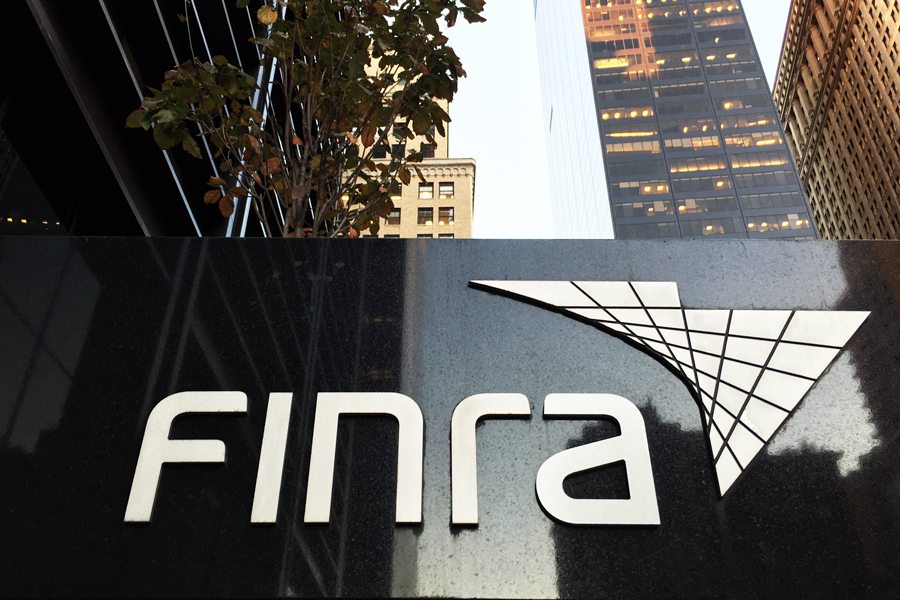

The Financial Industry Regulatory Authority Inc., which oversees 3,394 broker-dealers and 612,457 licensed securities professionals, on Tuesday issued its annual laundry list of industry concerns for the next 12 months, highlighting new areas for broker-dealers to watch out for, such as manipulative trading, fair pricing of fixed income securities and fractional shares, along with its repeated focus on key topics - think Regulation Best Interest - for the broad financial advice industry.
The report "addresses topics that remain perennially important, with updates to reflect evolving risks, industry trends and findings from Finra’s recent oversight activities," Greg Ruppert, Finra's executive vice president of market supervision, said in a statement. "This year, we have also increased the breadth of the report’s coverage by adding several new topics focused on insights originating in our market surveillance activities."
Finra this year refocused the report and created a separate section under the heading of "financial crimes," which includes cybersecurity, anti-money laundering and manipulative trading.
Last year, Finra critiqued the retail wealth management and financial advice industry for broker-dealers that failed to act in the best interests of their customers and didn't adequately address conflicts of interest in the first full year of operating under the new broker standard of conduct, Reg BI.
Reg BI prohibits brokerages and registered representatives from putting their financial interests ahead of their clients’ interests and requires that they disclose and mitigate conflicts of interest. The measure went into force in June 2020, after being approved by the Securities and Exchange Commission a year earlier.
In this year's report, Finra apparently added a series of questions broker-dealers should be asking about a variety of client transactions and whether or not those meet the standards of Reg BI. Those questions read like a guideline for compliance executives and focus on four areas: reasonable diligence in investment recommendations to clients; heightened scrutiny for high-risk or complex products; recommendations of new accounts for clients; and rollovers.
Rollovers, in which clients transfer assets from one retirement plan to another, have been a focus of securities regulators for years. A large concern is that clients move assets from an old account into assets that are more highly priced than those they owned before.
Finra wants firms to pay attention to these transactions, according to the report. The report asks whether the broker-dealer makes sure "that it has a reasonable basis to believe that the rollover or transfer itself, the account type being recommended, and any securities or investment strategies recommended are in the retail customer’s best interest?"
Meanwhile, Finra continues to keep its focus on products, including high-risk private placements and variable annuities, which have at times been sold improperly by financial advisors because of their high commissions. Broker-dealers have to be careful when selling these products under the new guidelines of Reg BI, according to the report, and weigh the positive and negative.
"Do your firm’s promotional communications for its private placements balance the potential benefits
of the investment with a disclosure of the potential risks, such as the potential for private placement
investments to lose value, their lack of liquidity and their speculative nature?" the report asks.
Broker-dealers also need to monitor financial advisors who recommend clients place more cash into variable annuities, according to the report.
Firms should be mindful of the "process for supervisory review when a registered representative recommends additional deposits into existing variable annuity contracts," as well as their "process for
documenting the rationale for the additional deposit," according to the report.

Since Vis Raghavan took over the reins last year, several have jumped ship.

Chasing productivity is one thing, but when you're cutting corners, missing details, and making mistakes, it's time to take a step back.

It is not clear how many employees will be affected, but none of the private partnership's 20,000 financial advisors will see their jobs at risk.

The historic summer sitting saw a roughly two-thirds pass rate, with most CFP hopefuls falling in the under-40 age group.

"The greed and deception of this Ponzi scheme has resulted in the same way they have throughout history," said Daniel Brubaker, U.S. Postal Inspection Service inspector in charge.
Stan Gregor, Chairman & CEO of Summit Financial Holdings, explores how RIAs can meet growing demand for family office-style services among mass affluent clients through tax-first planning, technology, and collaboration—positioning firms for long-term success
Chris Vizzi, Co-Founder & Partner of South Coast Investment Advisors, LLC, shares how 2025 estate tax changes—$13.99M per person—offer more than tax savings. Learn how to pass on purpose, values, and vision to unite generations and give wealth lasting meaning
